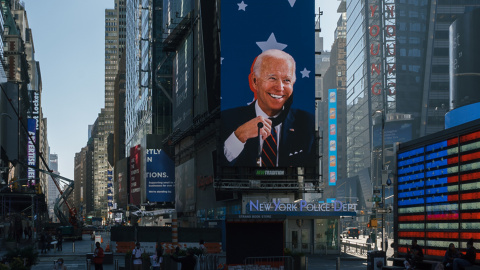-
Team TechTree
13:55 14th Jan, 2025
Biden’s AI Export Rules Impact Chip Stocks: Balancing National Security and Industry Growth | TechTree.com
Biden’s AI Export Rules Impact Chip Stocks: Balancing National Security and Industry Growth
The Biden administration’s latest move to restrict the export of advanced AI chips to over 120 countries has sent ripples across the technology and financial sectors.
Introduced under the "AI Diffusion Rule," the policy aims to safeguard U.S. technological dominance and national security by limiting the global distribution of high-performance AI chips. However, the restrictions have also sparked debates about their implications for innovation, trade, and the chip industry’s future.
The New Export Controls
The rules categorize countries into three groups:
- Unrestricted Access: Countries aligned with U.S. interests can freely access American AI technology.
- Restricted Access: Nations must acquire special licenses for specific AI chips.
- Embargoed Access: Over 120 countries face severe restrictions, including China, Russia, and others deemed high-risk.
The controls primarily target cutting-edge chips used in training large AI models, such as Nvidia’s A100 and H100 GPUs, which have become indispensable for advanced machine learning applications.
Impact on Chip Stocks
The policy has had an immediate effect on chipmakers.
- Nvidia: Shares dropped over 6% following the announcement. Nvidia, whose GPUs dominate the AI market, has called the restrictions overly broad and potentially harmful to global innovation.
- Micron Technology: Stock prices also fell, reflecting investor concerns over reduced international demand.
- Broadcom and AMD: Both companies saw their valuations dip, highlighting the broader industry impact.
Despite the downturn, some analysts suggest the policy could spur long-term innovation in the U.S. as domestic demand for AI chips rises.
Balancing National Security and Economic Growth
The administration’s goal is clear: prevent adversaries from leveraging American AI advancements for military or strategic gains. However, this comes with trade-offs:
- Innovation Bottleneck: Restricting chip exports could slow AI advancements in partner countries, potentially stifling global collaboration.
- Economic Costs: The semiconductor industry relies heavily on global markets, and reduced exports could hurt revenues and slow growth.
- Geopolitical Tensions: The rules could exacerbate tensions with countries like China, which is already ramping up efforts to develop its own AI chips.
Commerce Secretary Gina Raimondo defended the policy, stating that national security must take precedence over short-term economic gains.
Industry Response
Chipmakers and tech leaders have expressed mixed reactions:
- Nvidia: CEO Jensen Huang warned that the restrictions could encourage adversaries to develop alternative technologies, undermining the U.S.'s long-term competitive edge.
- Trade Groups: Organizations like the Semiconductor Industry Association have called for more precise guidelines to prevent unintended economic fallout.
- Startups and Researchers: Concerns have been raised about reduced access to cutting-edge chips for non-military applications, potentially hindering innovation.
The Global AI Race
The policy underscores the intensifying competition between the U.S. and China in the AI and semiconductor sectors. While the U.S. seeks to maintain its technological edge, China is aggressively investing in its domestic chip industry to reduce dependence on foreign technology.
The export controls may also spur the rise of alternative chip manufacturing hubs in countries like South Korea, Japan, and the EU, which could fill the void left by restricted U.S. exports.
The Biden administration’s AI export rules highlight the delicate balance between securing national interests and fostering global innovation. While the restrictions aim to prevent adversaries from gaining access to cutting-edge technology, they also pose challenges for the semiconductor industry and international collaboration.
As the global AI race heats up, the success of these policies will depend on their ability to protect U.S. security without stifling the technological progress that drives economic growth. For now, chipmakers face an uncertain landscape, with both risks and opportunities shaping the future of this critical sector.
TAGS: AI Chips
- DRIFE Begins Operations in Namma Bengaluru
- Sevenaire launches ‘NEPTUNE’ – 24W Portable Speaker with RGB LED Lights
- Inbase launches ‘Urban Q1 Pro’ TWS Earbuds with Smart Touch control in India
- Airtel announces Rs 6000 cashback on purchase of smartphones from leading brands
- 78% of Indians are saving to spend during the festive season and 72% will splurge on gadgets & electronics
- 5 Tips For Buying A TV This Festive Season
- Facebook launches its largest creator education program in India
- 5 educational tech toys for young and aspiring engineers
- Mid-range smartphones emerge as customer favourites this festive season, reveals Amazon survey
- COLORFUL Launches Onebot M24A1 AIO PC for Professionals








TECHTREE